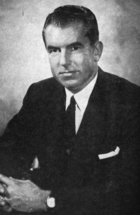Robert Stafford
Stafford is best remembered for his staunch environmentalism, his work on higher education, and his support, as an elder statesman, for the 2000 Vermont law legalizing civil unions for gay couples.
[9] In 1942, Stafford joined the United States Navy Reserve for World War II and was commissioned as an ensign.
[9] Assigned to the Intelligence branch, he completed his initial training at Dartmouth College and at Fort Dix, New Jersey.
[9] Stafford later requested sea duty and served as senior watch officer aboard USS West Point, the Navy's largest troop transport ship.
[9] During his service aboard West Point, the ship made numerous voyages across the Atlantic to Europe and Africa.
[10] He was assigned as gunnery officer aboard USS Mission Bay, a Reserve training ship berthed in Bayonne, New Jersey, and served until February 1953.
By the late 1950s, the Democratic Party was becoming increasingly competitive in Vermont, and in the 1958 election, Stafford won the governorship over Bernard J. Leddy with only 50.3% of the vote.
[8] In 1960, Stafford was the Republican nominee for Vermont's lone seat in the U.S. House of Representatives, supported by all factions of his party because he was regarded as the strongest challenger to Democrat William H. Meyer, who had broken the Republican Party's 100 year hold on statewide offices by winning election to Congress in 1958.
[17][18] In September 1971, Stafford resigned his seat in the House to accept appointment to the Senate, temporarily filling the vacancy caused by the death of Winston L.
As he neared retirement from the Senate, New York Times writer Philip Shabecoff wrote in a profile of Stafford that his tendency to keep his own counsel meant he "may give the worst interview of any public official in the capital."
[22] In the Republican primary, McMullen faced Fred Tuttle, a retired dairy farmer who had starred in a mock documentary film called Man with a Plan, a comedy about a retired farmer who decides to run for Vermont's seat in the United States House of Representatives.
[23] Tuttle's candidacy was partly an attempt to generate publicity for the film, and partly an attempt to mock McMullen as a carpetbagger and flatlander (Vermont slang for an out-of-stater) who had moved to Vermont only because he thought it would be easier to run for the Senate there than in more populous Massachusetts, where McMullen had previously resided.
[25] Tuttle immediately announced his intention to vote for incumbent Democratic Senator Patrick Leahy, after which the two made several joint appearances.
[27] Before the 2000 presidential elections, Stafford explained his decision to support civil unions: "I consider that love is one of the great forces in our society and especially in our state of Vermont.


